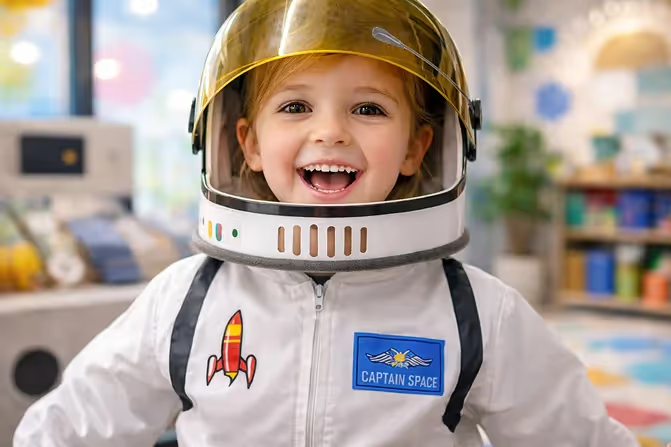Early years settings have a huge role to play in society. They contribute to children’s learning and development, support them to develop social relations, and function as a ‘gateway’ into society. They also allow parents to work, engage in educational programs and even meet and bond with other parents. In most countries, early childhood education and care (ECEC) centers focus on continuity and stability, creating additional thresholds for families to meet, specifically those who have lower access to childcare. Centers need practical tools to enhance the accessibility of childcare settings.
Artevelde University of Applied Science provided concrete tools in their Peer Learning Activity (PLA)* entitled “A whole-family approach in early year settings: Why we need it, how it works and what it means for children, parents, staff, settings?.
This PLA aimed to highlight the importance of cross-sectoral collaboration and implementing a whole-family approach in early childhood services. Read the interview with An Raes of Artevelde University of Applied Science, as she shares more on the theme, its importance in her work, and what other Members can learn from her PLA experience. Stay to the end to access the tools shared during this PLA!
Can you share a brief overview of the PLA you hosted online?
This PLA session was about the whole family approach to childcare. Nowadays, most people think childcare is only about taking care of the children. We see that, if you take into account the whole family, it can have a lot of benefits, especially when the family lives in more difficult circumstances.
Flexible childcare allows the whole family to benefit from childcare. Children from vulnerable families benefit most from childcare, but their families often have trouble finding a place. So, this approach can be very valuable for staff. It helps them consider the circumstances when, for example, planning sessions and interactions with the family.
To give a more concrete example, we've worked a lot with unemployed families or people who want to start a trajectory towards employment. It might be the case, like in my country, that those families have to go for a full daycare option for three or four days a week. That is far too expensive. What a family in this situation needs is occasional childcare.
Access to occasional childcare is rather limited. But, when awareness about what childcare centers do for families increases, they are often willing to adapt schemes and be more flexible to different circumstances.
Of course, in the PLA, we did try to answer all the questions that come with these situations – because there are a lot of other issues. It is also difficult to run occasional childcare options because of regulations or financial issues. There are also pedagogical concerns when a child only attends a few hours a week or irregularly.
We focused on the business side, the team side, and the pedagogical side; that's what we tackled during the PLA. Through four sessions, each on a different topic, we covered different sides of this issue.
What was the most meaningful part of hosting a PLA for you and your organization?
It's a great opportunity to share the work you've done with a wider audience and see how it lands in an international context – to see whether others recognized the issue and if the solutions we offer are meaningful to them.
You learn differences between countries; it's very interesting to have discussions around these. PLAs can also be a good starting point for new collaborations. For us as an organization, and for me, it was a good way to share.
What would you like to let other ISSA Members know about hosting or participating in an online PLA?
It was the first time that I did this online for such a broad audience. I learned from it; if I do it again, I will do better.
We were very ambitious with our PLA. We planned four sessions on fixed dates, and I think the split sessions made it difficult to attract people to attend all of the sessions. That is something to be conscious of when organizing your PLA.
ISSA is an organization with many partners across many countries, so the timing of sessions is important. In our case, a higher number of people subscribed than the number that attended. Our attendance was better for a session we did online only in Belgium. I also think it had to do with the COVID-19 pandemic and the fact that there are a lot of events online.
I must also say that doing the PLA, making some mistakes, and learning from that helped me focus more when I was teaching and doing other webinars later!
Can you share an example of how the topic of your PLA is important in your work?
That's an easy question because it's at the core of my work. This topic is what I write about, what I teach, and how I inspire others. I have a dream to collaborate on this topic internationally.
We have been able to influence policy a little bit in Belgium. A report from the Social Economic Council (the report shares formal advice to policymakers) picked up on the topic of flexible and occasional childcare. The report is meant to bring attention to policymakers. However, it is a dangerous topic as well. While children and families are the most important, companies can sometimes see another value. The topic is tricky because companies might see advantages that are at odds with the wellbeing of families, and our task is always to put children and families at the center of services.
Where can you find more? If you are interested in learning more on this topic, have a look at the resources below.
- Business Models for Holistic Childcare Toolbox
- Feasibility study for upscaling: Providing Access to Childcare and Employment (PACE)
- Providing Access to Childcare and Employment (PACE): Impact report (2016–2020)
- The Pace Project [Video]
- Flexibility in childcare
You can also visit the website of Artevelde University College or their partner organization Karel de Grote Hogeschool.
*Every year ISSA Members benefit from Peer Learning Activities (PLAs), which aim to build Members’ capacity, deepen their knowledge and act as enabling spaces for Members to co-create new knowledge. You can learn more about PLAs offered in the ISSA Network here.




